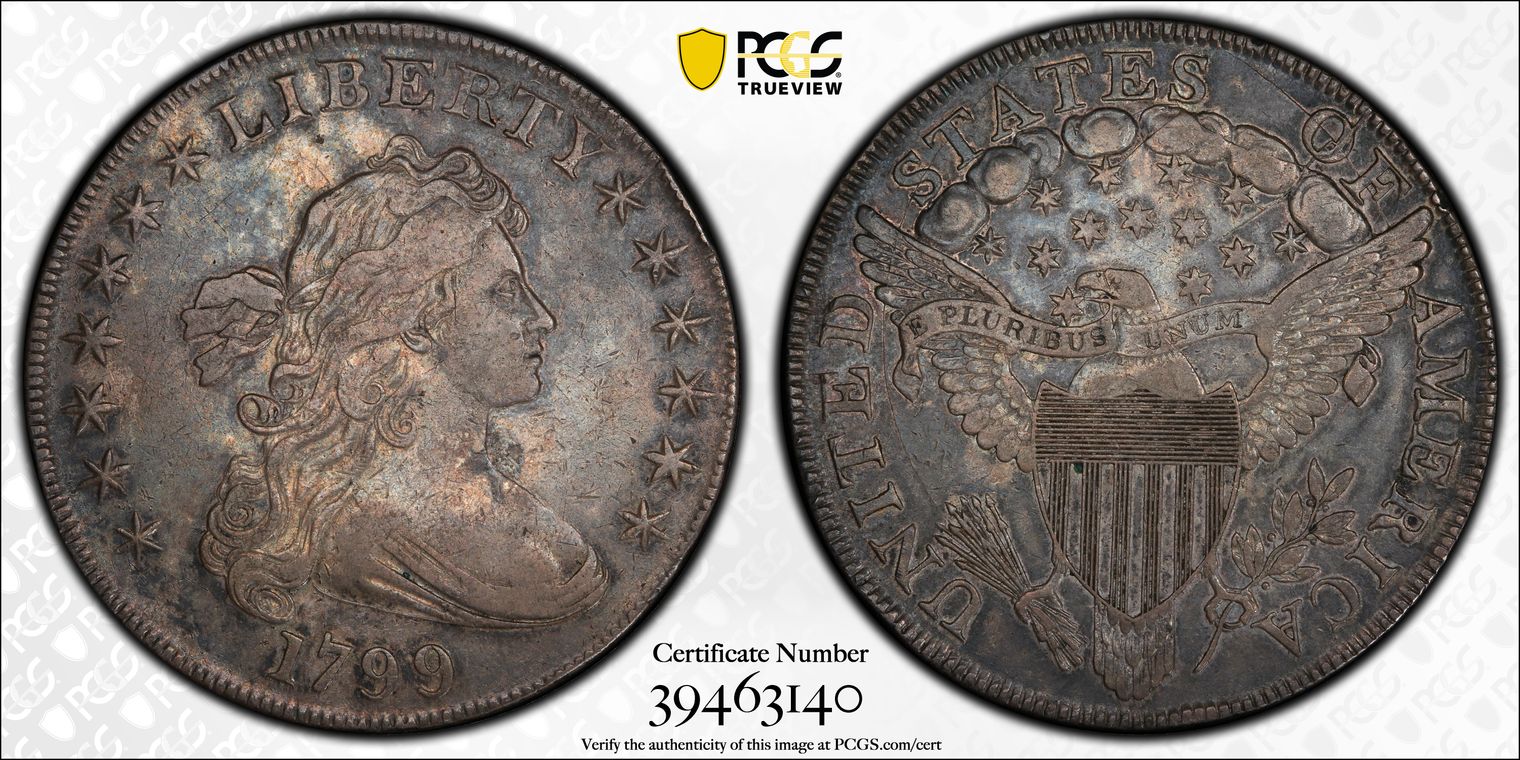1799 $1 BB-163 VF35 认证号39463140, PCGS号40054
专家评论
Q. David Bowers
The following narrative, with minor editing, is from my "Silver Dollars & Trade Dollars of the United States: A Complete Encyclopedia" (Wolfeboro, NH: Bowers and Merena Galleries, Inc., 1993). Note: the Notable Specimens list should be used with caution - it has been updated in my 2013 edition of "The Encyclopedia of United States Silver Dollars 1794-1804."Bolender 10, Haseltine 10
OBVERSE 4: See description under 1799 BB-156. In this combination the "pocket" or "cobweb" under throat (die clash mark) has been removed by relapping the die. Upper side of 1 in date is a straight line. The Bolender Collection specimen shows a light die crack through last three stars. (Early die states do not show the obverse crack through stars 11-13.)
Obverse die used to strike 1799 BB-156 (with clash marks), BB-157, BB-161 (now relapped), BB-162, BB-163, and BB-164.
REVERSE K: Leaf point between left corner and left side of upright of I in AMERICA. Farthest arrow point is under right upright of N. Point of star enters eagle's mouth, and touches lower part of eagle's beak. Another point of same star points to left upright of U in PLURIBUS. Far right edge of A is over cloud 3. Most show a die crack from border through OF, bottom of AMERICA, eagle's tail, arrows, left wing, up through ST, top of AT.
Reverse die used to strike 1799 BB-163 only.
DIE STATES:
Die State I: Early state; perfect dies. No obverse or reverse cracks. May not exist.
Die State II: Bolender-10b. Obverse crack connects stars 11-12-13 but not bust (this is visible only on high grade specimens). With reverse cracks from border through OF, to wing tip, through AMERICA, through branch, through eagle's tail, through arrows, below UNITED, through wing, to S. May not exist.
Die State III: Obverse crack connects stars. On reverse, peripheral crack continues 'through first T of STATES, through top of A, to border. This is the die state usually seen.
Die State IV: Obverse crack extends to outside ray of star on reverse, additional cracks develop: Vertically from border through 0, between clouds 7 and 8, toward eagle's. head, splits, and branch goes left through a star. Crack from wing, through right ribbon end, into field to left of branch end, Crack from branch to eagle's leg to tail, Crack from interior of branch upward to below ER. Crack from top of A, down through TES, to cloud 5, splits, two cracks go down and to the. left, and one goes to right. The die could not have survived long beyond this point. Rare die state.
COLLECTING NOTES: 1799 BB-163 shares the spotlight with BB-166 as one of the two most plentiful varieties of the year. I estimate that 1,000 to 1,800 of this variety exist. Curiously, nearly all are in lower grade levels through VF, plus a few scattered EF and AU coins. The offering of a Mint State coin should be a major event (at least, once the rarity of such is widely known). This variety must have been well distributed in the channels of commerce, or there may be some other explanation why so few high-grade coins were saved. In comparison, more examples of 1799 BB-166 survive in higher grades.
If die states I and II exist as described, BB-162 and BB-163 would have been struck in an interrupted sequence. First, BB"163 would have been struck, then the reverse for BB-162 was placed in the press to strike additional dollars, and finally the reverse for BB-163 was put back in the press to continue production. Additional study of these two varieties is necessary to verity this scenario.
NOTABLE SPECIMENS:
CSNS Convention Sale Specimen. MS-60. McIntire, CSNS Convention Sale, 1988:571. "MS-60. Early die state. Well centered, denticles are bold and quite even, strike is good, surfaces are nearly pristine and lustrous beneath light gray toning, high points are golden colored."
Heritage Specimen. MS-60. Heritage, March 1989 Sale:484 "Mint State (60/60). Full prooflike surfaces beneath hazy golden steel toning. Very sharply struck."
Hollinbeck-Kagm Specimen. MS-60. Hollinbeck-Kagin Sale. June 1970:626. "Unc. bluish golden, edge nick."
October Sale Specimen. MS-60. Stack's, October Sale, 1990: 1660. "Brilliant Unc., golden and iridescent. The obverse shows some hairlines from an old cleaning. Well struck."
French Specimen. MS-60. Stack's, Auction '84, 1984:1186. "Choice Brilliant Unc. Hairline scratch across neck. Superb russet and iridescent, slightly sea green on reverse." Stack's, French Family Collection, 1989:11. "Choice Brilliant Unc, A hairline scratch across neck. Russet and iridescent toning, slightly sea green on reverse." Superior Galleries, H. Roland Willasch Collection, 1990:534. "Medium gray with ample lustre in the fields. Defect-free save for a faint hairline scratch on Liberty's neck and a reeding mark above the eagle's head. Reverse color is most pleasant, a soft sea green with loads of frost. Light die cracks mentioned by Bolender."
Harte Specimen. AU-55. Bowers and Ruddy, Roy Harte Collection 1977:2788. "Lustrous and bright borderline Unc. A hint of rubbing on the highest points."
PCGS #
40054
设计师
Robert Scot
边缘
Lettered: HUNDRED CENTS ONE DOLLAR OR UNIT
直径
40.00 毫米
重量
27.00 克
铸币数量
423515
金属成分
90% Silver, 10% Copper
更高评级数量
13
评级较低的钱币数量
13
地区
The United States of America
价格指南
PCGS 数量报告
拍卖 - PCGS 评级的
拍卖 - NGC 评级的

























